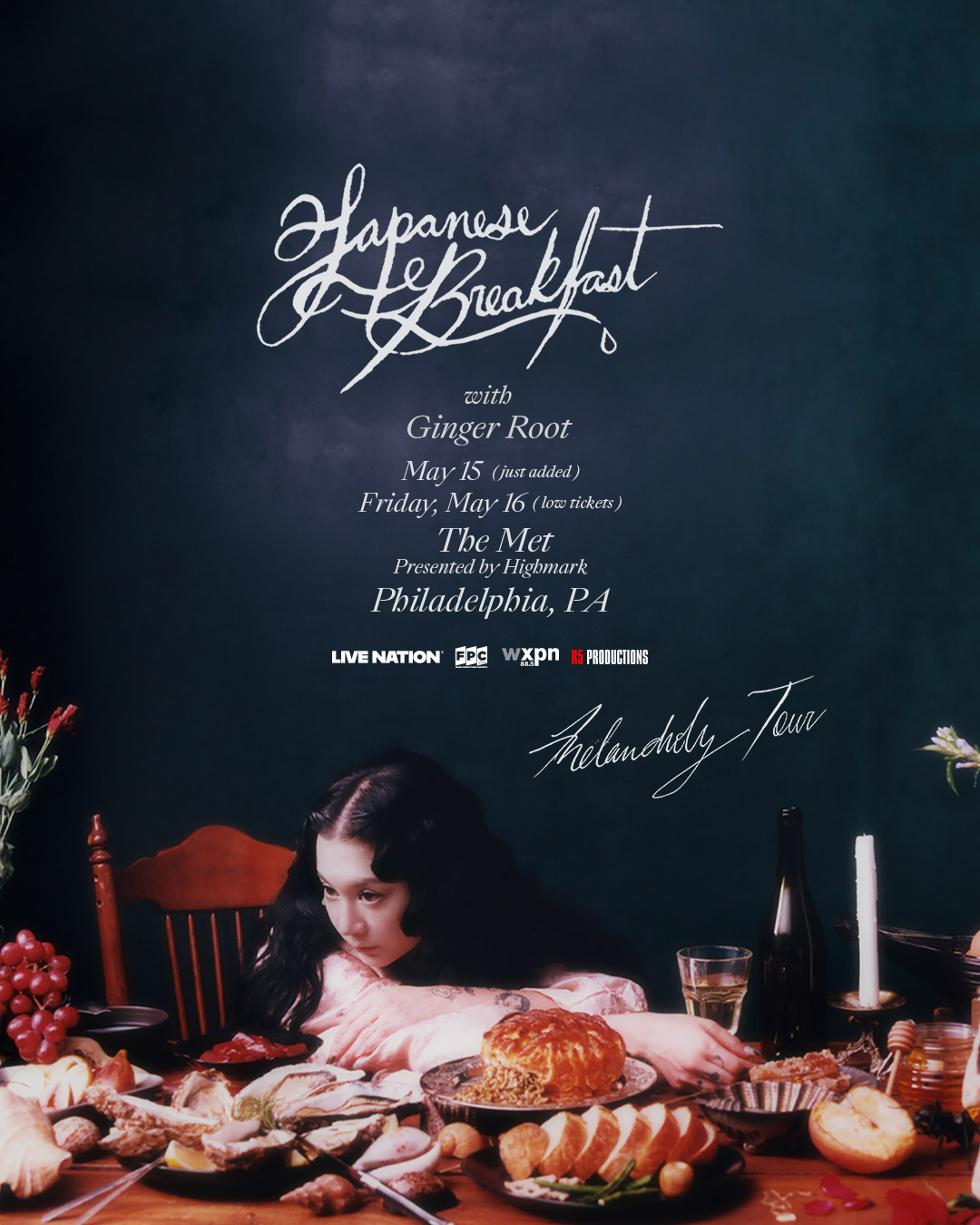WXPN 88.5 Welcomes | The Melancholy Tour
Japanese Breakfast
Ginger Root

JAPANESE BREAKFAST
After a decade making the most of improvised recording spaces set in warehouses, trailers and lofts, Japanese Breakfast’s fourth album, For Melancholy Brunettes (& sad women), marks the band’s first proper studio release. Produced by Grammy Award winner Blake Mills — an innovator of uncommon subtlety, known for his work with everyone from Bob Dylan to Fiona Apple and quietly regarded as many a legacy artist’s favorite guitar player — and tracked at the venerable Sound City in Los Angeles — birthplace of After The Gold Rush, Fleetwood Mac and Nevermind among other classics — the record sees front-woman and songwriter Michelle Zauner pull back from the bright extroversion that defined its predecessor Jubilee to examine the darker waves that roil within, the moody, fecund field of melancholy, long held to be the psychic state of poets on the verge of inspiration. The result is an artistic statement of purpose: a mature, intricate, contemplative work that conjures the romantic thrill of a gothic novel.
For Melancholy Brunettes follows a transformative period in Zauner’s life during which her 2x GRAMMY nominated breakthrough album Jubilee and her bestselling memoir Crying In H Mart catapulted her into the cultural mainstream, delivering on her deepest artistic ambitions. Reflecting on that success, Zauner came to appreciate the irony of desire, which so often commingles bliss and doom. “I felt seduced by getting what I always wanted,” she says. “I was flying too close to the sun, and I realized if I kept going I was going to die.”
The plight of Icarus and other such condemned ones lends For Melancholy Brunettes its most persistent theme, the perils of desire. Like light dispersed, its spectral parts take the album’s characters through cycles of temptation, transgression and retribution. On “Orlando in Love” — a riff on John Cheever’s riff on Orlando Innamorato, an unfinished epic made up of 68 ½ cantos by the Renaissance poet Matteo Maria Boiardo — the hero is a well meaning poet who parks his Winnebago by the sea and falls victim to a siren’s call, his 69th canto (even in the lofty realm of classical myth Zauner has a soft spot for innuendo). “Honey Water” plumbs the quiet rage of a woman married to an unfaithful man, watching him cede again and again to lust like a base insect perpetuating its own demise.
The lure of honey water draws you from my arms so needy
You follow in colonies to sip it from the bank
In rapturous sweet temptation you wade in past the edge and sink in
Insatiable for a nectar drinking til your heart expires
”Men in Bars,” a murder ballad in the vein of “Ruby, Don’t Take Your Love to Town,” sung here as duet with Jeff Bridges, follows a relationship on the verge of a violent end as recollections of a happy courtship are raised wistfully and pitifully in the face of impending doom, infidelity once more ushering in destruction.
Though Zauner has experimented with science fiction on Soft Sounds from Another Planet and buoyant surrealism on Jubilee, the landscape of European Romanticism that underpins For Melancholy Brunettes and the dense tissue of classical allusion that comes with it marks new territory for a songwriter entering her artistic maturity. She credits a range of antecedents with inspiration. The forlorn café girl in Degas’ “L’absinthe”. The seascapes of Caspar David Friedrich. The passionate longing and wild, undulating moors in Wuthering Heights. Hans Castorp wrapped in his camel hair blanket, dreaming on the Berghof balcony. It is an atmosphere made palpable by the intricate, interlocking guitar arrangements that accompany much of the record, lapping like waves over the meter, often as oblique in their expression of the chord as Zauner can be in her polyvalence of feeling and insight.
But for all the record owes to the romantic imagination, the sensibility of Japanese Breakfast is too thoroughly contemporary to lapse into pastiche. Tracks like “Mega Circuit,” a ferocious minor key shuffle in which we are introduced to a gang of loitering incels, and “Winter in LA,” a tongue in cheek take on the edenic California of the Laurel Canyon era, could only have been written in our time. And for as often as Zauner assumes fictional, often male, often insidious personas on For Melancholy Brunettes, her own subjectivity cannot help but surface. “All of my ghosts are real,” she sings on “Picture Window,” a song that manifests the fear of loving someone so much you presage their loss. It is an anxiety rendered gut wrenchingly acute when one considers Zauner’s own history of grief, the loss of her mother having been a major theme of Japanese Breakfast’s work since Psychopomp and one which persists here albeit faintly, as unsuspected echoes of an irredeemable sadness.
Sadness is indeed the dominant emotional key of this record, but it is sadness of a rarified form: the pensive, prescient sadness of melancholy, in which the recognition of life’s essentially tragic character occurs with sensitivity to its fleeting beauty. Zauner finds space enough inside it for glimmers of hope. They are the consolations of mortals that poets before her have called out to and that poets after will continue to rediscover: love and labor, and though they run like tonic resolutions through the record’s many episodes, they sound most saliently on its final song, “Magic Mountain,” an engagement with Thomas Mann’s famous novel of the same name. Mann’s book is about a hapless young man, Hans Castorp, who checks in for a brief visit to a tuberculosis sanatorium and finds himself unable to leave for a period of seven years. Zauner reimagines herself as Hans and her artistic body of work as the mountain looming over her. It became a personal song, she says, “about confronting the narcissism that goes into being an artist and deciding I didn’t want it to destroy my potential for having a happy life.” For her, making any work feels like scaling a mountain, but from the perch of For Melancholy Brunettes, she surveys the future. “Bury me beside you,” she sings to her beloved, “In the shadow of my mountain.”
GINGER ROOT
A multi-instrumentalist, producer, songwriter, and visual artist from Southern California, Cameron Lew has crafted his Ginger Root project steadily since 2017, inviting a fervent and growing legion of fans into storylines drawn across mediums: captivating albums with accompanying films and globe-spanning tours. The Ginger Root sound — handmade yet immaculately polished synth-pop, alt-disco, boogie, and soul — takes shape through Lew’s lens as an Asian-American growing up enamored by 1970s and ‘80s music, specifically the creative and cultural dialogue between Japanese City Pop and its Western counterparts from French Pop to Philly Soul to Ram-era McCartney. SHINBANGUMI, his long-awaited third LP, and Ghostly International debut set for physical release in 2024 with a visual album component, translates roughly to a new season of a show. It finds Lew more poised, idiosyncratic, and intentional than ever in a new chapter of life, unlocking “exactly what Ginger Root should sound and feel like,” he says. “In terms of instrumentation and musicality, it’s the first time that I felt very confident and comfortable with what everything should be comprised of. On the more personal side, I’m coming out of the last four years of writing, touring, and living as a different person; SHINBANGUMI is a platform to showcase my new self.”
Since his first release of “aggressive elevator soul” music and dispatch from his beloved weekly YouTube cover series during college, Lew has captained the ship of Ginger Root, able to write, record, and mix the music while creating the art and videos from scratch. What makes Ginger Root special is the project’s ability to weave influence beyond pastiche into a bigger picture, exploring that rarified pop pleasure center where referential meets refreshing.
In 2018, the project delivered its first album in collaboration with Acrophase Record, Mahjong Room, followed by several projects including the 2020 LP, Rikki. Between each move, Ginger Root has played alongside many modern Indie standouts, such as Khruangbin, Durand Jones, Omar Apollo, The Marias, and Hippo Campus.
With much of Rikki’s release feeling lost to the moments of that year, Lew decided to take a step back and try to write a succinct project to engage listeners for as long as possible. His redirected energy, paired with the newfound influence of Japanese art and culture from his experience learning to speak the language, yielded City Slicker in 2021. On the strength of breakout songs like “Juban District” and “Loretta,” the project connected with a massive audience on the internet, with his YouTube amassing 160,000 subscribers and his Spotify nearly hitting 1 million monthly listeners.
Ginger Root released the Nisemono EP in 2022 and has since played sold-out shows across North America, Europe, and Asia as fans await new music. In 2024, Ginger Root presents SHINBANGUMI across a sequential music video series, resuming the conceptual narrative from his 2022 EP Nisemono, which follows Ginger Root as a newly-fired music supervisor in 1987 starting his own media conglomerate, Ginger Root Productions. “If you watch music videos one through eight, you’ll be presented with a story that’s comparable to a traditional movie; something I’ve always wanted to do.”

